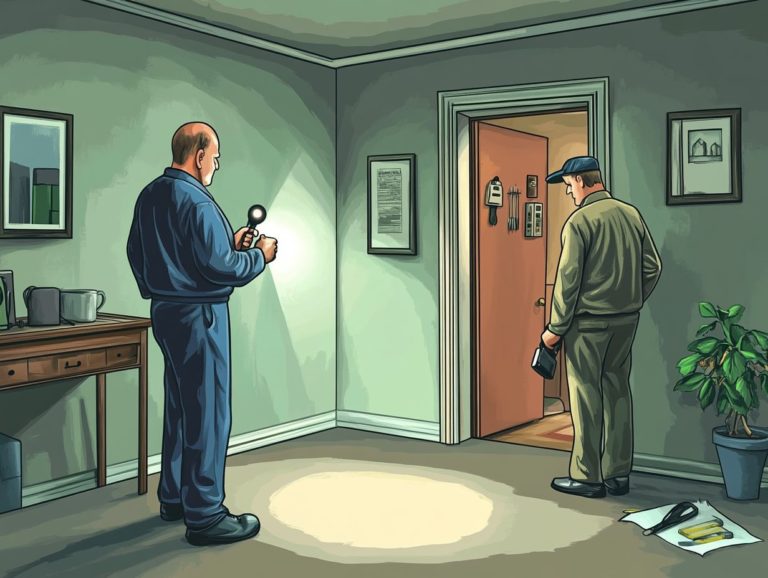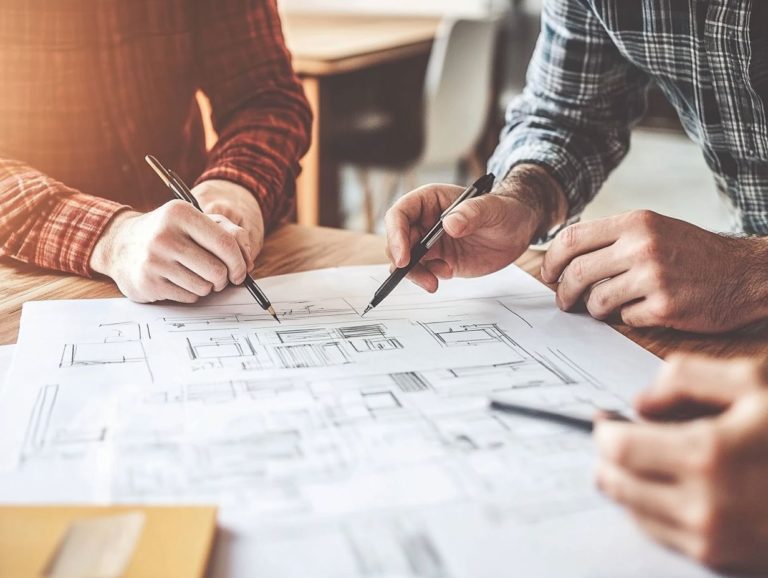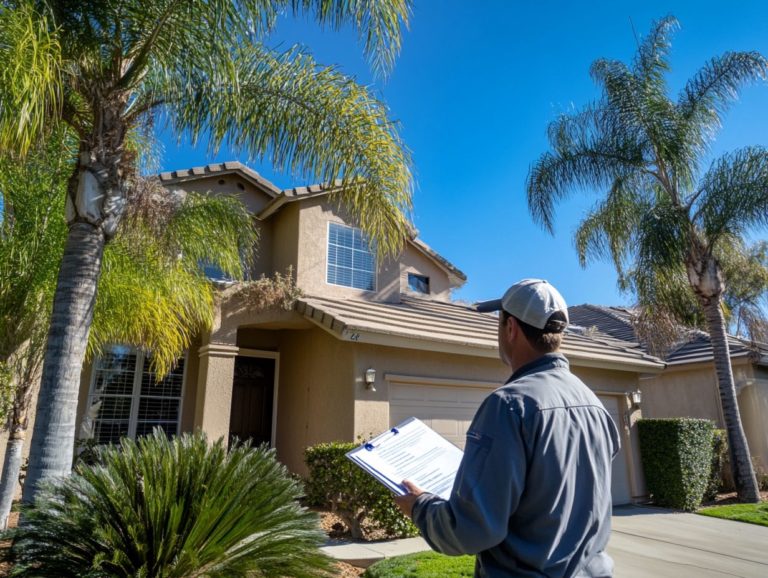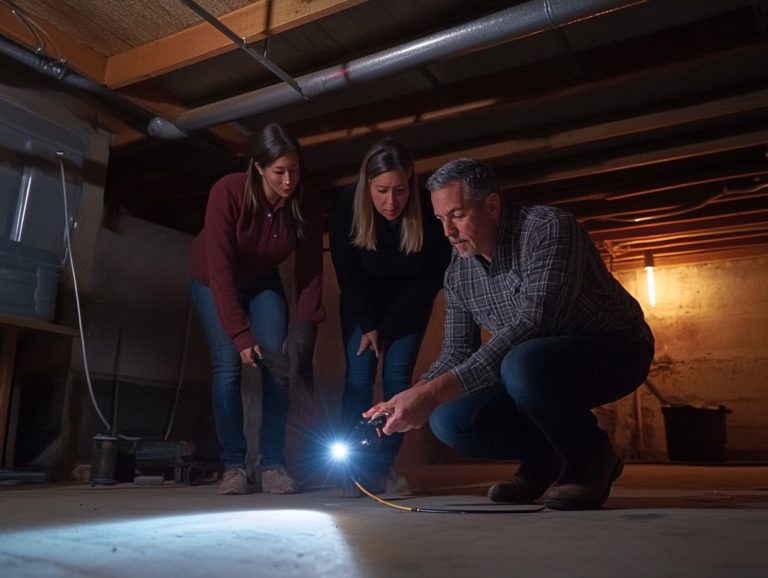The Basics of Home Inspection for Buyers
Purchasing a home is one of life s most significant investments, and understanding its condition is crucial.
A home inspection is a key step in the buying process, offering essential insights into the property s health and safety.
Get ready to dive into the essentials you need! This article highlights common issues you might encounter, provides guidance on selecting the right inspector, and outlines the benefits of diligent research.
Embark on this journey through home inspections to ensure you make a fully informed decision.
Contents
Key Takeaways:
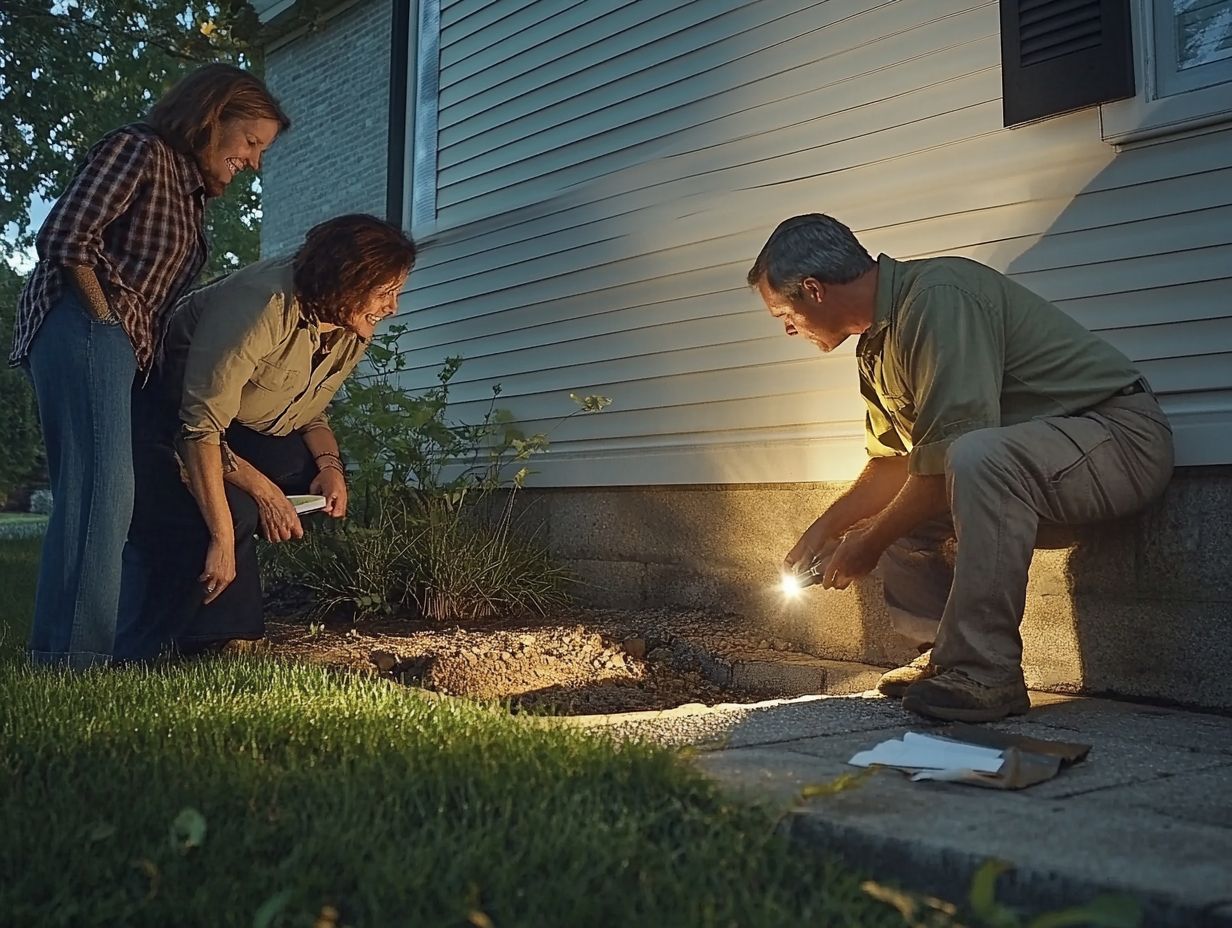
A home inspection is a thorough assessment of a property’s condition, including its structure, systems, and overall safety.
It is crucial for buyers to schedule a home inspection to identify potential issues and gain insights into understanding the basics of home inspections to make informed decisions during the home buying process.
A reliable home inspector examines key areas such as the roof, plumbing, electrical, and HVAC systems and provides a detailed report of any issues found.
What is a Home Inspection?
A home inspection is a thorough evaluation carried out by a certified inspector to check the overall condition of a property and ensure it meets essential safety and livability standards.
This vital process involves a visual examination of key elements, including structural components, electrical systems, plumbing issues, and the HVAC system.
By uncovering potential concerns, home inspections equip first-time homebuyers with the insights needed to make informed decisions, especially regarding the role of home inspections for first-time buyers and any inspection contingencies.
Why is a Home Inspection Important for Buyers?
Home inspections are essential in the homebuying journey, offering the importance of home inspections for property buyers that boost your confidence and protect your investment.
Skipping a thorough inspection could mean missing potential deal-breakers, leading to unexpected repair costs and complications during negotiations.
Don t overlook the importance of inspections! Recognizing their significance helps you effectively utilize seller disclosures and inspection reports, ensuring your purchase agreement includes all necessary contingencies to protect your interests.
What to Expect During a Home Inspection
Knowing what to expect during a home inspection can significantly reduce the anxiety of first-time homebuyers and ensure you are well-prepared for the benefits of home inspections for buyers on inspection day.
Typically, the inspection process involves a certified inspector performing a comprehensive evaluation of the property s structural components, electrical systems, plumbing, and HVAC over several hours.
Once the inspection is complete, you will receive a detailed report outlining the findings, highlighting any significant problems along with associated inspection fees.
What a Home Inspector Looks For

A home inspector carefully checks several crucial areas and components of a property to ensure its safety and condition. This process involves assessing structural elements, including the foundation, roof, and walls, along with essential systems like electrical, plumbing, and HVAC.
By following a detailed inspection checklist, the inspector uncovers potential issues that could impact the property’s value, serving as key negotiation points during buyer discussions.
Common Issues Found During Home Inspections
Home inspections often uncover a variety of issues that can range from minor maintenance needs to significant problems that could jeopardize safety and value.
You may encounter typical concerns such as plumbing problems, electrical system faults, and HVAC deficiencies, all of which can lead to substantial repair costs if ignored.
By understanding these common issues, you empower yourself to make informed decisions and effectively negotiate necessary repairs with the seller, leveraging the inspector’s recommendations to your advantage.
How to Choose a Reliable Home Inspector
Selecting a reliable home inspector is crucial for getting a complete property check. It requires careful consideration of several key factors.
As a prospective buyer, seek out inspectors with credible credentials, such as those certified by the American Society of Home Inspectors or the International Association of Certified Home Inspectors. This ensures a professional evaluation.
An experienced inspector will be well-versed in common issues that arise during inspections, enhancing the overall process.
Importance of a Home Inspection for First-Time Homebuyers
For first-time homebuyers, grasping the significance of a home inspection can truly transform your experience in navigating the intricate homebuying process. Understanding the home inspection process for buyers offers vital insights into the property’s condition and helps you pinpoint potential issues.
Ultimately, this shapes your purchase agreement and inspection contingency. By functioning as a safety net, a comprehensive inspection gives you the power to negotiate necessary repairs or reevaluate your options based on the inspector s findings.
Taking action can save you from unexpected costs! Understanding the state of the home enables you to craft a more advantageous purchase agreement.
This puts you in a stronger position to request credits or concessions from the seller, all informed by the understanding the basics of home inspection reports. Entering this journey with confidence is essential for anyone stepping into the realm of homeownership for the first time.
Inspection Fees and Closing Costs
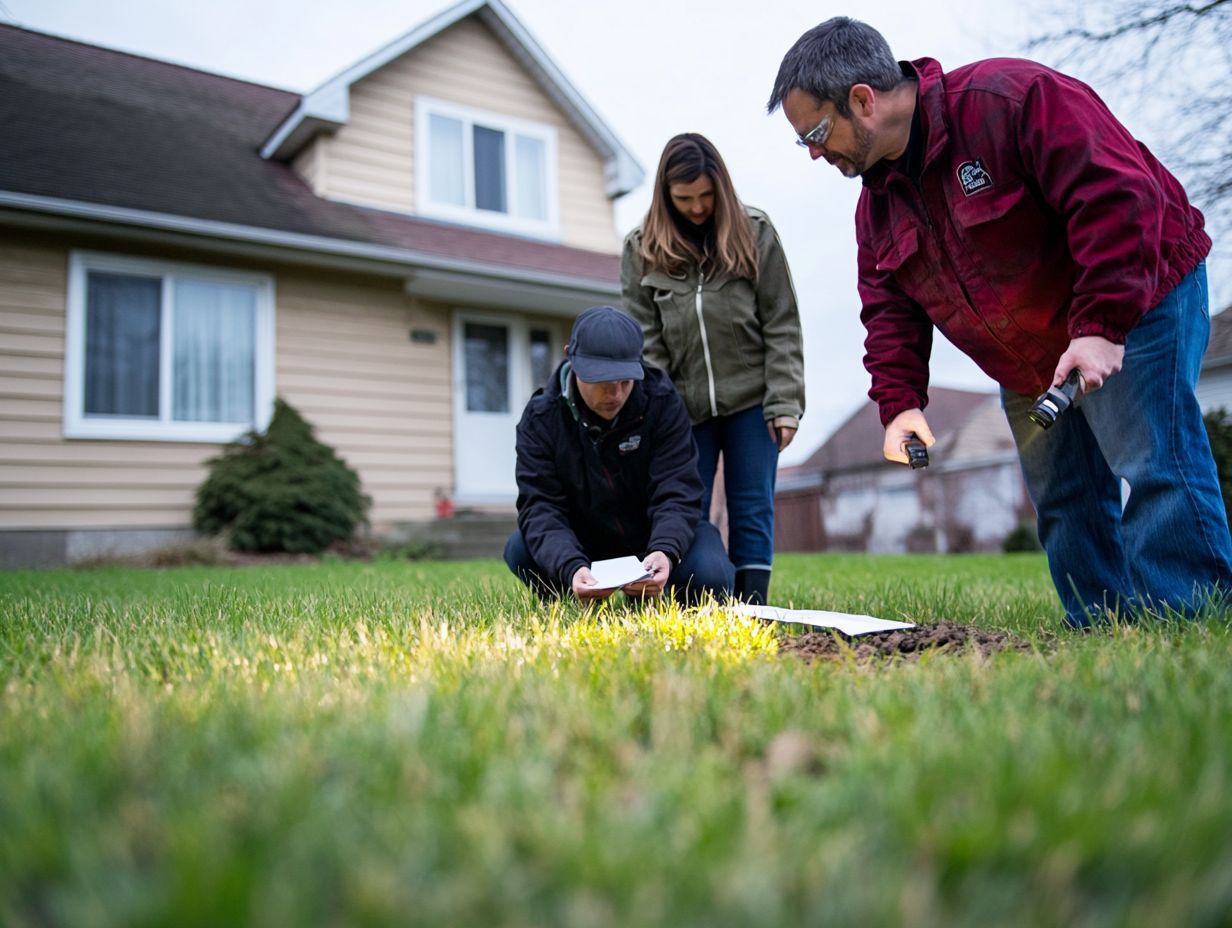
Understanding inspection fees and closing costs is essential for budgeting effectively throughout the homebuying journey.
Home inspections come with fees that can vary widely based on factors like the property’s size and location. These factors directly influence overall repair and closing costs.
These inspection fees typically range from a few hundred dollars to well over a thousand, depending on the complexity of the inspection and the market demand in your area. Remember that these fees are merely one component of the closing costs, which can also include:
- Title insurance
- Appraisal fees
- Attorney fees
If the inspection uncovers potential issues, you should prepare for potential repair costs or negotiations with the seller. This makes it crucial to have a comprehensive understanding of all costs involved in the transaction.
Questions to Ask Your Home Inspector
When you engage a home inspector, it s crucial to ask the right questions to gain a thorough understanding of their qualifications and the inspection process.
Inquire about the inspector’s credentials, experience, and the specifics covered in their detailed report for valuable insights into their capabilities.
As a potential buyer, consider asking about the inspector’s approach to various types of inspections, including structural, electrical, and plumbing assessments, as well as understanding the home inspection process.
Understanding how long the inspection typically takes and what resources the inspector uses during this process can shed light on their thoroughness.
Transparency regarding follow-up support and how the inspector addresses any issues is equally important. Fostering open communication will ensure you receive a comprehensive overview, significantly influencing your decision-making during the home purchasing journey.
What Happens After the Inspection?
Once the home inspection wraps up, you receive a detailed inspection report highlighting the findings, including any significant issues discovered during the evaluation. This report becomes your essential negotiation tool.
Armed with this comprehensive document, you can confidently approach the seller with specific requests, whether they involve minor fixes or major structural repairs.
Sellers are typically expected to respond to these findings by either agreeing to complete necessary repairs before closing or offering you a credit to handle the issues after you’ve moved in.
Knowing how to effectively leverage the inspection report can dramatically influence the overall deal, possibly leading to price reductions or additional concessions that cater to your interests.
Staying focused on open communication is key to ensuring mutual satisfaction and facilitating a smoother transition into your new home.
Don’t hesitate to ask your inspector about their experience and how they can support you throughout the homebuying process!
Tips for a Successful Home Inspection
Preparing for a successful home inspection involves key strategies that can enhance the process. Educate yourself about common issues and ask relevant questions to understand the components that influence property value.
Engaging actively with the inspector helps you gain valuable insights into the property’s condition. Taking notes during the walkthrough allows for a clearer understanding of potential concerns.
Reviewing the inspection report is crucial. It reveals existing problems and valuable preventive maintenance tips.
Discuss the home’s systems, like plumbing and electrical, to help prioritize repairs or upgrades based on the inspector s feedback. Don’t leave your future to chance get informed and be proactive!
Frequently Asked Questions

What is home inspection?
A home inspection is a visual examination of the house’s structure and systems. This includes the roof, foundation, plumbing, and electrical systems. It s done by a trained home inspector before a sale.
Why is a home inspection important for buyers?
A home inspection helps buyers understand the property’s condition. It also identifies potential issues or safety hazards before making a final decision and highlights the importance of a home inspection for buyers, providing negotiating power for repairs or price adjustments.
Who typically pays for the home inspection?
Usually, the buyer pays for the home inspection. Always include a home inspection contingency in the purchase contract. This condition allows the buyer to withdraw from the deal if significant issues arise.
How long does a home inspection usually take?
The duration can vary depending on the home’s size, age, and condition. On average, it takes about 2-3 hours for a thorough inspection, but larger or older homes may take longer.
Can buyers attend the home inspection?
Yes! Buyers are encouraged to attend the home inspection. This allows them to ask questions and see any potential issues the inspector finds.
What should buyers do if issues are found during the home inspection?
If major issues are found, buyers have options. They can negotiate with the seller for repairs or a price reduction, ask for a credit towards closing costs, or decide to back out of the deal. Discuss these options immediately with your real estate agent to make the best decision.

